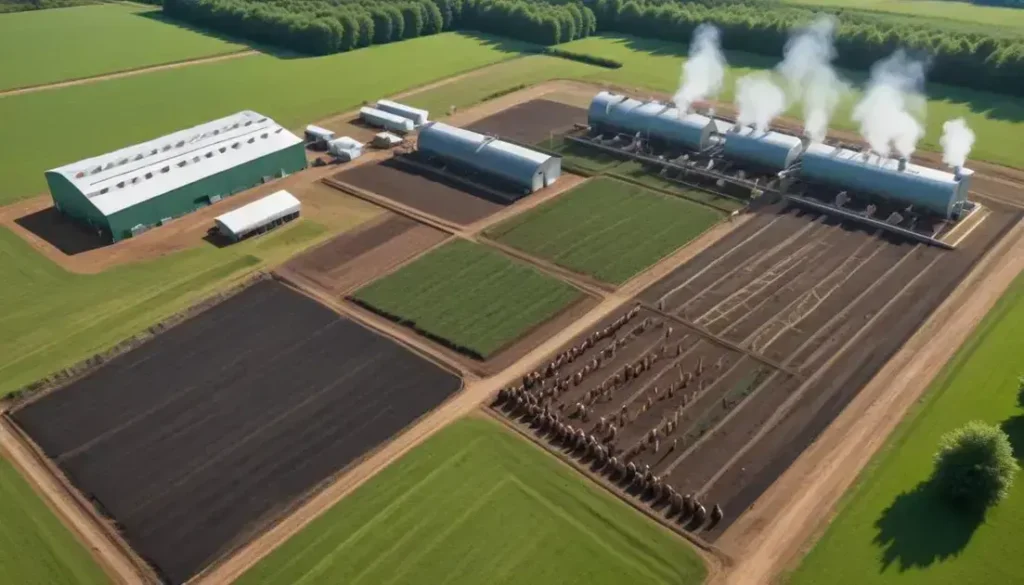The GB300 NVL72 platform enhances sustainability in data centres by optimising energy management, integrating renewable energy sources, and employing AI-driven solutions, resulting in reduced operational costs and a lower environmental impact for UK firms.
The role of Nvidia in transforming data centres is crucial—its innovative GB300 NVL72 platform significantly enhances energy efficiency and sustainability.
Introduction to Nvidia’s GB300 NVL72 platform
Nvidia’s GB300 NVL72 platform is a groundbreaking development in data centre technology, designed to enhance sustainability and operational efficiency. This state-of-the-art platform integrates advanced power management systems that respond dynamically to computing loads. By utilising AI-driven algorithms, the GB300 optimises energy consumption, significantly reducing carbon footprints for firms.
One of the key features of the GB300 NVL72 is its ability to perform power smoothing. This innovative technique ensures that energy usage remains stable, even during peak loads. It not only protects the integrity of operations but also maximises the use of renewable energy sources. As data demands escalate, maintaining a balance between energy conservation and performance becomes crucial.
Moreover, the platform’s architecture allows for seamless integration with existing infrastructure, making it an attractive choice for businesses looking to upgrade. The GB300 is designed to accommodate future needs, ensuring that companies remain competitive in a rapidly evolving market. Leveraging Nvidia’s expertise in AI technology, the platform empowers UK data centres to meet the dual goals of efficiency and environmental responsibility.
Impact on energy management in data centres
The integration of the GB300 NVL72 platform significantly transforms energy management within data centres. By employing advanced AI algorithms, it optimises power consumption in real time, ensuring that energy is used efficiently. This leads to a noticeable reduction in operating costs, which is crucial given the rising energy prices.
A key advantage of the GB300 NVL72 is its ability to monitor and adjust energy use based on demand fluctuations. This dynamic energy adjustment not only stabilises power loads during peak times but also enhances the overall sustainability of data centre operations. With this system, UK businesses can experience increased reliability and resilience against energy shortages.
Moreover, the platform’s AI capabilities facilitate the integration of renewable energy sources. Data centres can harness solar or wind power more effectively, adapting their energy usage to match availability. This shift not only promotes green energy but also aligns with global sustainability initiatives.
In summary, the GB300 NVL72 platform represents a pivotal investment for organisations aiming to modernise their energy management strategies. Its sophisticated technology empowers UK firms to achieve both financial savings and environmental goals, paving the way for a more sustainable future.
Benefits of power smoothing techniques
One of the most significant advancements brought by the GB300 NVL72 platform is the implementation of power smoothing techniques. These methods play a crucial role in managing energy fluctuations within data centres, enhancing both operational efficiency and system stability. By regulating power loads, businesses can reduce the risk of equipment failures and improve reliability.
Power smoothing works by adjusting the energy fed into the system according to real-time demand. This intelligent management ensures that peak energy loads are effectively managed, preventing sudden spikes that can cause disruptions. As a result, data centres experience less downtime, which is particularly critical for companies that rely on constant access to their data.
Additionally, adopting power smoothing can lead to significant cost savings. By optimising energy consumption, organisations can lower their electricity bills and lessen their overall carbon footprint. This approach aligns with sustainability goals, making it an attractive option for UK firms aiming to improve their environmental impact.
Furthermore, integrating power smoothing with renewable energy sources allows for better energy utilisation. It supports a transition to greener energy, reinforcing the commitment to sustainable practices. The combined benefits of reliability, cost efficiency, and environmental literacy make power smoothing a vital technique in modern data centre operations.
Comparison with older systems
When comparing the GB300 NVL72 platform to older data centre systems, several key differences emerge that highlight its advantages. Traditional systems often struggle with energy efficiency, leading to higher operational costs and increased environmental impact. The GB300, however, incorporates advanced AI technology to optimise energy use dynamically, offering significant savings.
A notable aspect of the GB300 is its ability to manage fluctuations in power demand effectively. Older systems typically rely on static energy management techniques, which can result in inefficiencies during peak usage times. In contrast, the GB300 adapts in real-time, ensuring that power loads are balanced and stabilised.
Moreover, the integration of renewable energy sources is much more seamless with the GB300. While previous systems may require extensive retrofitting to accommodate green energy, the GB300 is designed to work with these sources from the outset, enhancing its sustainability profile.
Additionally, the GB300’s infrastructure allows for greater scalability. Older systems can become bottlenecks as data demands grow, but the GB300 can easily expand to meet evolving needs without significant downtime or disruption. Overall, the GB300 NVL72 platform represents a leap forward in data centre efficiency and sustainability compared to its predecessors, making it a wise choice for forward-thinking businesses.
Case study: CoreWeave’s deployment
CoreWeave’s deployment of the GB300 NVL72 platform serves as a compelling case study in optimising data centre operations. This innovative company specialises in cloud computing and GPU-based services, targeting users who require high-performance computing. By integrating the GB300 into their infrastructure, CoreWeave has achieved remarkable improvements in energy efficiency and operational flexibility.
Since adopting the GB300, CoreWeave reported a substantial reduction in power consumption. The platform’s AI-driven energy management systems allow for real-time adjustments based on workload demands, which has greatly enhanced their ability to manage peak energy loads. This efficiency translates to both cost savings and a lower carbon footprint, aligning with their sustainability goals.
Additionally, CoreWeave has utilised the platform’s power smoothing techniques to ensure stability during high-demand periods. This adaptation has led to improved reliability, minimising disruptions and enhancing customer satisfaction. Clients benefit from uninterrupted services, which is critical for businesses relying on consistent performance.
The success of CoreWeave’s deployment illustrates the transformative potential of the GB300 NVL72 platform. As the need for scalable and efficient data centre solutions continues to grow, the insights from this case study highlight how modern technology can drive significant advancements in the industry.
Financial implications for UK firms
The introduction of the GB300 NVL72 platform has brought significant financial implications for UK firms operating within data centres. One of the most immediate benefits is the reduction in energy costs. As energy expenses continue to rise, optimising power consumption is crucial. The GB300’s AI-driven management system allows firms to save considerably, translating into lower operational costs.
Moreover, enhanced energy efficiency often results in better return on investment (ROI) for businesses. Companies investing in the GB300 can expect faster payback periods due to reduced spending on electricity and improved performance metrics. This financial predictability can be a game-changer for firms navigating the competitive landscape.
Additionally, the platform’s capabilities in integrating renewable energy sources further provide financial advantages. As more organizations aim to meet sustainability targets, the seamless connection with green energy not only helps reduce carbon footprints but also capitalizes on potential government incentives and grants aimed at promoting sustainable practices.
Investing in the GB300 NVL72 may also position UK firms more favourably within the market. By adopting cutting-edge technology, businesses can attract environmentally conscious clients and enhance their competitive edge. Overall, the financial implications are multifaceted, offering both direct savings and strategic advantages for firms willing to embrace this advanced technology.
Future of sustainable data centre operations
The future of sustainable data centre operations is rapidly evolving, with the GB300 NVL72 platform at the forefront of this transformation. As environmental concerns grow, data centres are increasingly prioritising energy efficiency and sustainability. By leveraging advanced technologies, these facilities are working towards minimising their carbon footprints while maintaining high-performance standards.
One critical aspect of this future is the integration of renewable energy sources. Data centres that utilise solar, wind, or other green energy will not only reduce reliance on fossil fuels but also capitalise on economic incentives tied to sustainability initiatives. The GB300 enables seamless incorporation of these energy sources, further enhancing operational efficiency.
Moreover, the application of AI and machine learning technologies will play a pivotal role in optimising energy management. These systems allow data centres to analyse real-time data, making informed decisions that enhance energy use and further reduce costs. Predictive analytics can help foresee energy demand patterns, ensuring resources are allocated efficiently.
As regulations around energy consumption tighten and stakeholders demand greater corporate responsibility, the adoption of sustainable practices will be essential for data centres to stay competitive. The GB300 NVL72 platform exemplifies how embracing innovation can not only fulfil these requirements but also drive future growth in the industry.
In conclusion, embracing sustainable technology is essential for the future.
The GB300 NVL72 platform represents a significant step forward for data centres striving for sustainability. By optimising energy use and integrating renewable sources, companies can lower their costs and reduce their environmental impact.
As the demand for efficient data management increases, adopting advanced technologies will be crucial. The use of AI and machine learning will enable data centres to function more effectively while promoting green energy practices.
Ultimately, a commitment to sustainability not only benefits the environment but also enhances business performance. By investing in technologies like the GB300, UK firms can position themselves as leaders in a competitive marketplace.
Thus, it is clear that the future of data centres lies in sustainable practices, ensuring a healthier planet for generations to come.
Frequently Asked Questions
What is the GB300 NVL72 platform?
The GB300 NVL72 platform is a state-of-the-art technology designed for data centres, optimising energy management and enhancing sustainability through AI-driven solutions.
How does the GB300 help reduce energy costs?
By using advanced algorithms, the GB300 dynamically adjusts power consumption in real time, leading to significant energy savings for data centres.
Can the GB300 integrate with renewable energy sources?
Yes, the GB300 is specifically designed to seamlessly incorporate renewable energy, helping firms meet their sustainability goals.
What are the benefits of power smoothing techniques?
Power smoothing techniques minimise energy fluctuations, ensuring stability during high-demand periods and reducing the risk of equipment malfunctions.
How can adopting the GB300 improve business performance?
Implementing the GB300 can lower operational costs, enhance reliability, and attract environmentally conscious customers, thereby improving overall business performance.
Why is sustainability important for data centres?
Sustainability is critical for data centres as it helps reduce environmental impact, comply with regulations, and cater to growing customer demands for green practices.


